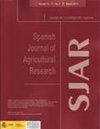Replacing soybean meal with micronized soybeans in starter piglet diets and their residual effects during growing and finishing phases
IF 0.8
4区 农林科学
Q3 AGRICULTURE, MULTIDISCIPLINARY
引用次数: 0
Abstract
Aim of study: To assess the effects of replacing soybean meal (SBM) with micronized soybean (MS) on the digestibility (Experiment I) and performance (Experiment II) of piglets in the starter phase and its residual effects on the growing/finishing phases and carcass and meat quality traits Area of study: São Paulo, Brazil. Materials and methods: The treatments consisted of different levels of dietary replacement of SBM with MS at intervals of 25%, totaling five inclusions (0%, 25%, 50%, 75%, and 100%). Main results: In Exp. I, the administration of the pre-starter I diet resulted in a positive linear effect (p<0.05) on the apparent digestibility coefficient (ADC) of crude protein and a quadratic effect (p<0.01) on the ADCs of dry matter and crude fat. For the pre-starter II diet, there was a quadratic effect on the ADCs of dry matter and crude fat (p<0.05). For the starter diet, a negative linear effect on the ADC of dry matter was observed (p<0.01). In Exp. II, the feed intake and weight gain decreased linearly throughout the starter phase (p<0.01), while no significant difference (p>0.05) in feed conversion was observed with increasing inclusion level of MS. Research highlights: Replacing SBM with MS in the starter diet did not influence performance during the growing and finishing phases. Meat quality was not affected but a lower retail cut weight were observed in animals fed a starter diet with higher levels of MS.微粉大豆代替豆粕对仔猪生长肥育期的残留影响
研究目的:评价微粉大豆(MS)替代豆粕(SBM)对仔猪发育期消化率(试验一)和生产性能(试验二)的影响及其对生长/肥育期胴体和肉质性状的影响。研究地区:巴西圣保罗。材料和方法:在不同水平的饲粮中以MS替代SBM,间隔为25%,共5个添加组(0%、25%、50%、75%和100%)。主要结果:在试验1中,随着MS添加水平的增加,预发酵剂I饲粮的饲料转化率呈正线性效应(p0.05)。研究重点:在发酵剂饲粮中用MS替代SBM对生长和肥育期的生产性能没有影响。肉的品质没有受到影响,但在喂食高水平MS的起始饲料的动物中,观察到较低的零售切重。
本文章由计算机程序翻译,如有差异,请以英文原文为准。
求助全文
约1分钟内获得全文
求助全文
来源期刊

Spanish Journal of Agricultural Research
农林科学-农业综合
CiteScore
2.00
自引率
0.00%
发文量
60
审稿时长
6 months
期刊介绍:
The Spanish Journal of Agricultural Research (SJAR) is a quarterly international journal that accepts research articles, reviews and short communications of content related to agriculture. Research articles and short communications must report original work not previously published in any language and not under consideration for publication elsewhere.
The main aim of SJAR is to publish papers that report research findings on the following topics: agricultural economics; agricultural engineering; agricultural environment and ecology; animal breeding, genetics and reproduction; animal health and welfare; animal production; plant breeding, genetics and genetic resources; plant physiology; plant production (field and horticultural crops); plant protection; soil science; and water management.
 求助内容:
求助内容: 应助结果提醒方式:
应助结果提醒方式:


